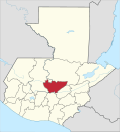Purulhá
Purulhá | |
|---|---|
Municipality | |
| Coordinates: 15°16′00″N 90°12′00″W / 15.26667°N 90.20000°W | |
| Country | |
| Department | |
| Government | |
| • Mayor | Sebastián Castro García |
| Area | |
• Municipality | 536 km2 (207 sq mi) |
| Population (2018 census)[2] | |
• Municipality | 56,822 |
| • Density | 110/km2 (270/sq mi) |
| • Urban | 7,901 |
| Climate | Cfb |
Purulhá is a town and municipality in the Baja Verapaz department of Guatemala. It is situated at 1,570 m (5,151 ft) above sea level. The municipality covers an area of 536 km² and the population was 56,822 at the 2018 census. The annual festival is June 10-June 13.
History
[edit]Verapaz Railroad
[edit]- Pancajché
- Santa Catalina La Tinta
- Panzós
- Cobán
The Verapaz Railroad began on 15 January 1894 with a contract for 99 years between Guatemala, then ruled by president José María Reina Barrios, and Walter Dauch, representative of the "Verapaz Railroad & Northern Agency Ltd." The contract settled the rules for the construction and maintenance of a 30 mile railroad line between Panzós and Pancajché. Passenger service travelled twice a week, on Mondays and Thursdays; mail also arrived by ship every Wednesday and cargo came from Livingston, Izabal. Besides, there were train stops in Santa Rosita, Santa Catalina La Tinta, and Papalhá.[3]
In 1898, it was reported that given the coffee prosperity in Cobán, which in those days was the third largest city in Guatemala, the railroad was going to be extended to that city.[3] The railroad was in operation until 1965, when it was superseded by truck and highways.
-
Verapaz Railroad maiden voyage in 1894.
-
Verapaz Railroad steamboat sailing the Polochic river.[4]
-
Coffee transport.[4]
-
Verapaz Railroad engine in the 1900s.
Thomae family
[edit]The Thomae family, coming from German settlers from the 1880s, was the ruling family in Purulhá for most of the 20th century. By taking advantage of the pro-German policies of president Justo Rufino Barrios, Mauricio Thomae gathered the following coffee haciendas:[5]
| Year | Hacienda | Location |
|---|---|---|
| 1882 | Cubilgüitz | Cobán |
| 1889 | San Isidro | Purulhá |
| 1897 | Comija | Tamahú |
| 1897 | Popabaj | Tucurú |
| 1900 | Nueve Aguas | Purulhá |
| 1902 | Panzal | Purulhá |
| 1902 | Rocjá | Tamahú |
| 1902 | Paijá | Tucurú |
| 1905 | Chimox | Tucurú[5] |
During the régime of general Jorge Ubico (1931-1944), Mauricio Thomae became one of the most influential German Verapaz landowners, along with the Sarg, Sapper and Diesseldorf families. He took advantage of his close relationship with president Ubico, who had been Cobán's governor during the presidency of Manuel Estrada Cabrera and befriended several German families, including Thomae's.[5]
For most of the 20th century, the Thomae family kept Puruhlá under its control thanks to their large coffee plantations and farm land holdings, and despite the expulsion of most Germans from Guatemala during World War II. After the coffee crisis in 2000, the Thomaes diversified their investments into the power, tourism and forest incentive businesses; in fact, by 2015 they were planning on building the Enerjá megaproject (25 MW) which will connect to their other power generation project, El Cafetal (8,36 MW) in Finca Bremen, also owned by the Thomaes.[5]
Climate
[edit]Purulhá has a temperate climate (Köppen climate classification: Cfb).
| Climate data for Purulhá | |||||||||||||
|---|---|---|---|---|---|---|---|---|---|---|---|---|---|
| Month | Jan | Feb | Mar | Apr | May | Jun | Jul | Aug | Sep | Oct | Nov | Dec | Year |
| Mean daily maximum °C (°F) | 18.8 (65.8) |
20.2 (68.4) |
21.7 (71.1) |
22.4 (72.3) |
22.8 (73.0) |
22.2 (72.0) |
21.5 (70.7) |
21.8 (71.2) |
22.0 (71.6) |
21.1 (70.0) |
20.3 (68.5) |
19.7 (67.5) |
21.2 (70.2) |
| Daily mean °C (°F) | 14.6 (58.3) |
15.4 (59.7) |
16.7 (62.1) |
17.5 (63.5) |
18.2 (64.8) |
18.2 (64.8) |
17.8 (64.0) |
17.8 (64.0) |
17.9 (64.2) |
17.3 (63.1) |
16.2 (61.2) |
15.3 (59.5) |
16.9 (62.4) |
| Mean daily minimum °C (°F) | 10.4 (50.7) |
10.7 (51.3) |
11.8 (53.2) |
12.6 (54.7) |
13.6 (56.5) |
14.3 (57.7) |
14.1 (57.4) |
13.9 (57.0) |
13.9 (57.0) |
13.5 (56.3) |
12.1 (53.8) |
10.9 (51.6) |
12.7 (54.8) |
| Average precipitation mm (inches) | 81 (3.2) |
48 (1.9) |
68 (2.7) |
68 (2.7) |
174 (6.9) |
325 (12.8) |
329 (13.0) |
245 (9.6) |
272 (10.7) |
205 (8.1) |
125 (4.9) |
66 (2.6) |
2,006 (79.1) |
| Source: Climate-Data.org[6] | |||||||||||||
Geographic location
[edit]See also
[edit]Notes and references
[edit]References
[edit]- ^ "Byron Tejeda gana elección a alcalde de Salamá". Prensa Libre (in Spanish). Guatemala. 8 September 2015. Retrieved 8 September 2015.
- ^ Citypopulation.de Population of departments and municipalities in Guatemala
- ^ a b La Ilustración del Pacífico & 15 March 1898, p. 206
- ^ a b La Ilustración del Pacífico & 15 March 1898, pp. 203–204
- ^ a b c d "Nepotismo y la decadencia de la familia Thomae". Centro de Medios Independiente de Guatemala (in Spanish). Guatemala. 20 July 2015. Archived from the original on August 8, 2015. Retrieved 7 August 2015.
{{cite web}}: CS1 maint: unfit URL (link) - ^ "Climate: Purulhá". Climate-Data.org. Retrieved 20 August 2015.
- ^ SEGEPLAN. "Municipios de Baja Verapaz, Guatemala". Secretaría General de Planificación y Programación de la Presidencia de la República. Guatemala. Archived from the original on 29 June 2015. Retrieved 29 June 2015.
Bibliography
[edit]- La Ilustración del Pacífico (15 March 1898). "La revolución de septiembre". La Ilustración del Pacífico (in Spanish). II (38). Guatemala: Siguere, Guirola y Cía.




![Verapaz Railroad steamboat sailing the Polochic river.[4]](http://upload.wikimedia.org/wikipedia/commons/thumb/6/6c/Vaporferrocarrilverapaz1898.jpg/175px-Vaporferrocarrilverapaz1898.jpg)
![Coffee transport.[4]](http://upload.wikimedia.org/wikipedia/commons/thumb/9/99/Vaporpolochic1898.jpg/175px-Vaporpolochic1898.jpg)

